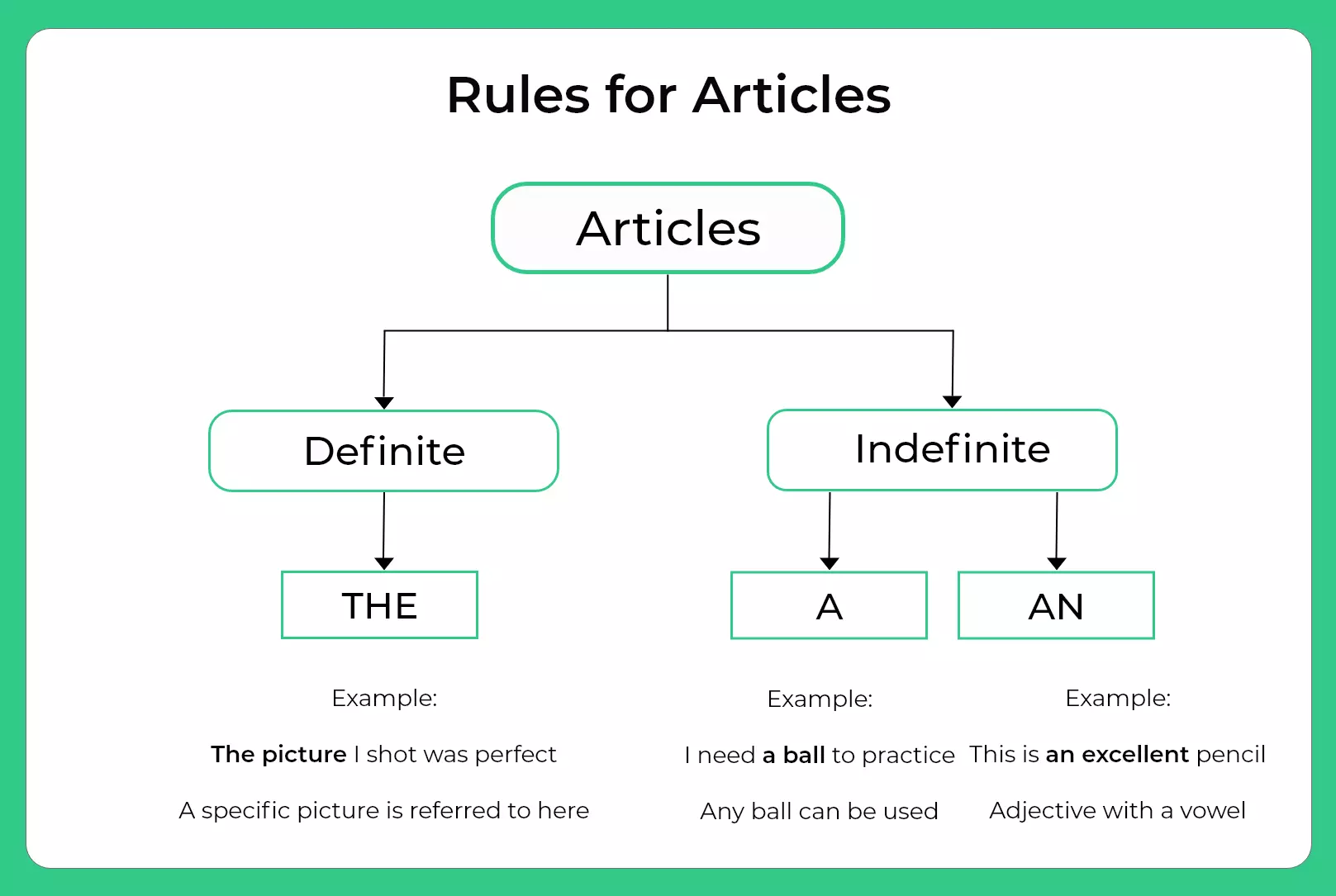Verbal Menu
- Basic Grammar
- Speech and Voices
- Tenses
- Articles
- Tenses and Articles
- Idioms and Phrases
- Subject Verb Agreement
- Prepositions and Conjunction
- Selecting Words
- Relative Pronoun
- Sentence Completion
- Sentence Ordering
- Contextual Vocabulary
- Jumbled Sentence
- Sentence Formation
- Error Identification
- Sentence Improvement and Construction
- Cloze Test
- Fill in the blanks
- Paragraph Ordering
- Para Jumbles
- Synonyms and Antonyms
- Synonyms
- Antonyms
- Reading Comprehension
- Get Off-campus Drive Updates
- Get Hiring Updates
- Contact US
PREPINSTA PRIME
Rules For Articles | Articles a, an, the rules
Rules for Articles
Rules for Articles is given here on this page!!
Articles are words that defines a noun to be specific or general. They are namely – ‘A’, ‘An’, ‘The’. Here are some rules for articles :
- A – used before consonants
- An – used before vowels
- The – used for specification of a noun.

Rules for Articles
Example:
The girl from the coffee shop was blonde.
With the use of ‘the’ in the sentence, we clearly bring out that the girl was a specific girl coming out from a specific coffee shop.
The Definite Article
- The Definite Article from among the three articles is ‘THE’.
- It specifies the objectivity of a noun.
- The definite article walks you through the particularity of a noun.
- For example, your friend might ask, “Are you willing to participate in the competition this year?” The definite article ‘the competition’ tells you that your friend is talking about a particular competition that the two of you know of.
- The definite article can be used with singular, plural, or uncountable nouns.
- With definite article it becomes easy to identify a noun in a sentence that might be otherwise vague or not clear in concept.
The Indefinite Article
- The indefinite article comes in the form of two articles – ‘a’ and ‘an’. ‘A’ is used before any consonant while ‘an’ takes its place before a vowel.
- The indefinite articles walks you through the general idea of a noun as a contrast to definite article.
- For example, you might ask your mom, “Should I wear a jeans to the party?” Your mom will know that you’re talking about wearing a jeans to the party. Not a particular one but jeans of any color or design.
- “Why don’t you wear an ankle length jeans?” your mom replies back. Here the indefinite article ‘an’ talks about a jeans of ankle length but not specifying which one.
Prime Course Trailer
Related Banners
Get PrepInsta Prime & get Access to all 200+ courses offered by PrepInsta in One Subscription
Rules for Articles: Using Indefinite Article ‘A’ & ‘An’
Rule 1:
In the singular sequence, a common noun also has an article prior to it. But an article doesn’t necessarily need a traditional plural noun. A plural common noun will have the article ‘the’ if we want to designate the noun.
Example:
- I ate a banana. (Refers to a random banana)
- I ate bananas at home. (No article is required)
- I have eaten the bananas again (Refers to the banana i have eaten earlier)
- I have eaten the bananas again before leaving the house. (Refers to the particular bananas which I ate earlier at the house.)
Rule 2:
You can choose between the two indefinite articles – a & an – by its sound. There are some exceptional cases against the general use of ‘a’ and ‘an’
- a university, a union, a useful book, etc.
- a one-dollar book, a one-man army, etc.
- an MA, a BA, an LLB, a BSC, etc.
Rule 3:
A or an – sometimes a sentence can translate a Proper noun into Common noun. Proper nouns are generally not preceded by articles but when it changes to common noun it needs an article.
Example:
- She regards herself as a Shakespeare. (Here, Shakespeare isn’t the person but a reference)
- He thinks his house is a Palace.
Rule 4:
We use indefinite articles to represent a number that is generally ‘one’/’each’/’per’.
Example:
- I am an hour late for the meeting. (One hour late)
- I have a car. (One car)
- The plane can travel 5m an hour ( one hour or per hour)
Rule 5:
Indefinite articles are often used before any descriptive adjectives.
Example:
- He is a good boy.
- What a nice car!
- She is a brilliant dancer
Rule 6:
‘A’ sometimes precede determiners, for example, a few, a little, a lot of, a most, etc. However, when you write a sentence using many, ‘a’ or ‘an’ is used after it.
Example:
- I have a few pens lying around on the table.
- There is a little water in the bottle
- Many a man tried to rescue the girl, but none could.
Rules for Articles: Using Definite Article ‘The’
Rule 1:
‘The’ is used to define anything specific or particular hence the name definite article.
Example:
- The lady is standing. ( a particular lady)
- I heard the dog barking. (a specific dog who was barking)
- Where is the book that i had lent you last month. (a specific book)
- I gave her a dress but she ripped the dress. (‘a dress’ becomes the dress’ in the second clause because the dress was not general anymore. It was the specific one that I lent.)
Rule 2:
At some places we can use ‘the’ to specify a particular group or class.
Example:
- The cows are domestic animal. (Refers to the whole group of cows.)
- The millenials are an advanced generation
- The honest are always honored (The+adjectives = plural noun)
- The genius are always valued
Rule 3:
To specify or particularize any non countable nouns, we can use ‘the’
Example:
- The stars in the sky shine so bright
- The sand in the desert is too hot.
- The water in this bottle is cold
Rule 4:
‘The’ article is used to address anything that is exclusive or unique (one of a kind).
Example:
- The earth is round
- The sun shines bright
- The poles have a cold temperature
Rule 5:
Generally, using ‘the’ for regional nouns relies on the scale and plurality of the objects referred to by such nouns. Except in some situations,’ The’ is commonly used everywhere.
Let’s take a look at the exceptions first.
‘The’ must not precede:
Names of:
- Continents: America, Asia, Europe, Australia etc.
- Countries: India, France, Spain
- States, cities, towns, or streets.
- Singular lakes, bays, mountains – Mount Everest, Mount Fuji, etc.
- Languages: Spanish, Russian, English, (You can use ‘the’ before languages to portray the people from such places)
- Sports, discipline/subject: mathematics, english, history, geography.
- Continents: America, Asia, Europe, Australia etc.
‘The’ must precede.
After listing the exceptions, let’s now see which geographical divisions can precede with ‘the’.
Names of:
- Oceans, gulfs, seas, and rivers: the Pacific, the Atlantic, the Nile, the Murray River,
- Countries with United states or islands: the United States of America (the USA), the UK, the UAE,
- Great lakes: the Great Lakes, the African Great Lakes
- Mountain ranges: the Himalayas, the Alps, the Andes, etc.
- Groups of Islands: the West Indies, the Andamans, etc
- Oceans, gulfs, seas, and rivers: the Pacific, the Atlantic, the Nile, the Murray River,
SAMPLE QUESTIONS
Question: 1
Choose the correct article from the options given below.
_______ moon looks beautiful tonight.
- A
- An
- The
- No Article
Explanation:
When referring to a unique celestial body like the moon the definite article “the” is used.
Question: 2
Choose the correct article from the options given below.
Laura is studying hard to clear _______ engineering entrance exam.
- A
- An
- The
- No article
Explanation:
Since”the” is used as the definite article to indicating specifically – “engineering entrance exam”.
Question: 3
Choose the correct article from the options given below.
Arnold is _______ honest person; he never tells lies.
- A
- An
- The
- No article
Explanation:
When a noun begins with a vowel sound the indefinite article “an” is used. In this case “honest” begins with a vowel sound (“o”).
Question: 4
Choose the correct article from the options given below.
_______ Nile River is the longest river in Africa.
- A
- An
- The
- No article
Explanation:
The sentence is talking about a specific river “the” is used as the definite article to indicate that it is referring to the Nile River specifically.
Question: 5
Choose the correct article from the options given below.
I found ____ interesting book at ____ Lucknow public library yesterday.
- an / a
- the/a
- an/the
- the/the
Explanation:
“Interesting” starts with a vowel sound so we use the indefinite article “an” before it.
We use the definite article “the” before “library” because it refers to a specific library.
Also Check Out
Get over 200+ course One Subscription
Courses like AI/ML, Cloud Computing, Ethical Hacking, C, C++, Java, Python, DSA (All Languages), Competitive Coding (All Languages), TCS, Infosys, Wipro, Amazon, DBMS, SQL and others
- Basic Grammar – Questions | Rules | How to Solve Quickly | Tricks & Shortcuts
- Speech and Voices – Questions | Rules | How to Solve Quickly | Tricks & Shortcuts
- Tenses – Questions | Rules | How to Solve Quickly | Tricks & Shortcuts
- Tenses and Articles – Questions | Rules | How to Solve Quickly | Tricks & Shortcuts
- Idioms and Phrases – Questions | Rules | How to Solve Quickly | Tricks & Shortcuts
- Subject Verb Agreement – Questions | Rules | How to Solve Quickly | Tricks & Shortcuts
- Prepositions and Conjunction – Questions | Rules | How to Solve Quickly | Tricks & Shortcuts
- Selecting Words – Questions | Rules | How to Solve Quickly | Tricks & Shortcuts
- Relative Pronoun – Questions | Rules | How to Solve Quickly | Tricks & Shortcuts
- Sentence Completion- Questions | Rules | How to Solve Quickly | Tricks & Shortcuts
- Basic Grammar – Questions |
Rules |
How to Solve Quickly |
Tricks & Shortcuts - Speech and Voices – Questions |
Rules |
How to Solve Quickly |
Tricks & Shortcuts - Tenses – Questions |
Rules |
How to Solve Quickly |
Tricks & Shortcuts - Tenses and Articles – Questions |
Rules |
How to Solve Quickly |
Tricks & Shortcuts - Idioms and Phrases – Questions |
Rules |
How to Solve Quickly |
Tricks & Shortcuts - Subject Verb Agreement –
Questions |
Rules |
How to Solve Quickly |
Tricks & Shortcuts - Prepositions and Conjunction –
Questions |
Rules |
How to Solve Quickly |
Tricks & Shortcuts - Selecting Words – Questions |
Rules |
How to Solve Quickly |
Tricks & Shortcuts - Relative Pronoun – Questions |
Rules |
How to Solve Quickly |
Tricks & Shortcuts - Sentence Completion- Questions |
Rules |
How to Solve Quickly |
Tricks & Shortcuts

 Apply For Jobs
Apply For Jobs Get Hiring Updates
Get Hiring Updates




Login/Signup to comment